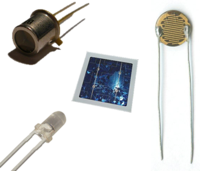
Photo from wikipedia
Abstract Energy consumption in a manufacturing facility comprises direct energy used in the manufacturing operations and indirect energy consumed by activities to maintain proper equipment conditions (e.g., heating and cooling).… Click to show full abstract
Abstract Energy consumption in a manufacturing facility comprises direct energy used in the manufacturing operations and indirect energy consumed by activities to maintain proper equipment conditions (e.g., heating and cooling). Reducing the energy consumption in a manufacturing facility requires sensors to monitor the energy usage patterns (“energy profiles”) and a concomitant data analytics process for correlating them with the activities being performed. This work explores the design and integration of optimal sensor networks for measuring and identifying the context of energy usage in manufacturing processes. This information is useful in production planning and scheduling to optimize energy usage and reduce energy cost. We explore a system-level representation of precision machining for optimal sensor locations and types that allow the monitoring of energy consumption. This is accomplished through maximization of a measure of the information matrix, subject to constraints on the cost of sensors. First, a system-level model is presented for predicting energy consumption in precision machining. A formulation is then presented for the selection of sensors and the operating mode for maintenance tests in manufacturing. The sensor network design is cast as a mixed-integer non-linear program that selects possible sensors based on their contribution to information gain with respect to energy consumption and their impact on equipment cost. For this purpose, we explore the sensitivity of the machining process with respect to admissible inputs at different system fault scenarios.
Journal Title: IFAC-PapersOnLine
Year Published: 2020
Link to full text (if available)
Share on Social Media: Sign Up to like & get
recommendations!